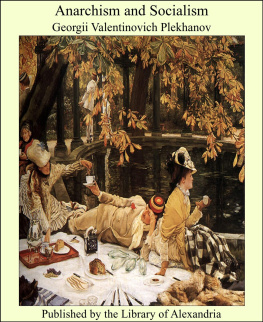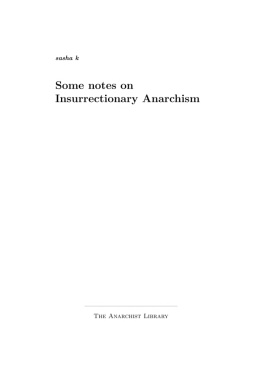ROUTLEDGE LIBRARY EDITIONS:
POLITICAL THOUGHT AND
POLITICAL PHILOSOPHY
Volume 22
THE ANARCHIST WAY
TO SOCIALISM
THE ANARCHIST WAY
TO SOCIALISM
Elise Reclus and Nineteenth-Century
European Anarchism
MARIE FLEMING
First published in 1979 by Croom Helm Ltd
This edition first published in 2020
by Routledge
2 Park Square, Milton Park, Abingdon, Oxon OX14 4RN
and by Routledge
52 Vanderbilt Avenue, New York, NY 10017
Routledge is an imprint of the Taylor & Francis Group, an informa business
1979 Marie Fleming
All rights reserved. No part of this book may be reprinted or reproduced or utilised in any form or by any electronic, mechanical, or other means, now known or hereafter invented, including photocopying and recording, or in any information storage or retrieval system, without permission in writing from the publishers.
Trademark notice: Product or corporate names may be trademarks or registered trademarks, and are used only for identification and explanation without intent to infringe.
British Library Cataloguing in Publication Data
A catalogue record for this book is available from the British Library
ISBN: 978-0-367-21961-1 (Set)
ISBN: 978-0-429-35434-2 (Set) (ebk)
ISBN: 978-0-367-23182-8 (Volume 22) (hbk)
ISBN: 978-0-429-27869-3 (Volume 22) (ebk)
Publishers Note
The publisher has gone to great lengths to ensure the quality of this reprint but points out that some imperfections in the original copies may be apparent.
Disclaimer
The publisher has made every effort to trace copyright holders and would welcome correspondence from those they have been unable to trace.
THE ANARCHIST WAY
TO SOCIALISM
Elise Reclus and Nineteenth-Century European Anarchism
Marie Fleming
1979 Marie Fleming
Croom Helm Ltd., 210 St Johns Road, London SW11
British Library Cataloguing in Publication Data
Fleming, Marie
The anarchist way to socialism
1. Reclus, Elise
2. Anarchism and anarchists France History
I. Title
335.83, 0924 HX894
ISBN 0-85664-867-1
First published in the United States 1979
by ROWMAN AND LITTLEFIELD, 81 Adams Drive, Totowa, N.J.
ISBN 0-8476-6158-X
Printed and bound in Great Britain
CONTENTS
| AEN | Archives de lEtat, Neuchtel |
| AFJ | Archives de la Fdration Jurassienne |
| AHG | Archives Historiques du Ministre de la Guerre, Vincennes |
| AN | Archives Nationales, Paris |
| Archief ER | Archief Elise Reclus |
| BFJ | Bulletin de la Fdration Jurassienne |
| BN | Bibliothque Nationale |
| BPU | Bibliothque Publique et Universitaire, Geneva |
| CIRA | Centre International de Recherches sur lAnarchisme |
| Dossier ER | Dossier Elise Reclus |
| Fonds ER | Fonds Elise Reclus |
| IFHS | Institut Franais dHistoire Sociale |
| IISG | International Instituut voor Sociale Geschiedenis |
| IWMA | International Working Mens Association |
| MEW | Marx Engels Werke |
| NA | Nettlau Archives |
| NAF | Nouvelles Acquisitions Franaises, Bibliothque Nationale, Paris |
| Papiers ER | Papiers Elise Reclus |
| P.Po. | Archives de la Prfecture de Police, Paris |
| PV du CFJ | Proces-verbaux des sances du Comit fdral jurassien |
TO THOSE I LOVE
Elise Reclus was an important figure in European anarchist circles from the 1870s, the time when the anarchists began to be distinguished from the wider socialist movement. In the late nineteenth century he contributed to the radical direction which the anarchist movement assumed and consistently supported the adoption of increasingly extreme measures. Unwavering in his hostility to the bourgeois state and party-political action, he relentlessly upheld the principle of propaganda by the deed, even when it was used to justify the terrorism which plunged Europe into a virtual state of panic in the early 1890s. The anarchist historian Max Nettlau wrote a biography of Reclus in 1928, but admitted that it represented only a first stage in coming to terms with the subject. Since the publication of Nettlaus work, much new material has come to light, in particular police files and unpublished correspondence. Reclus contribution to the development of late nineteenth-century European anarchism has, however, still received little attention from scholars.
Not only was Reclus known as a committed anarchist. He achieved worldwide acclaim as an early proponent of the scientific study of human geography. As author of the monumental nineteen-volume La Nouvelle Gographie Universelle (The New Universal Geography), he was the somewhat reluctant recipient of gold medals from both the Paris Geographical Society (1892) and the Royal Geographical Society of London (1894). His interest in geography can be traced to 1851, the very year in which he first put forth his social and political views in written form. As time went on his social and political thought and his theories of geography became ever more closely inter-related, until they achieved a final synthesis in his posthumously published LHomme et la Terre (Man and the Earth), the six-volume conclusion to La Nouvelle Gographie Universelle. He considered that, while the general nature of the data in his geographical and his social-political studies might vary, its generic quality remained the same. Nor was there any significant distinction between the methods of analysis employed in each. The links between the two areas of enquiry deserve close attention. It is worth noting his remark to the Dutch socialist, Ferdinand Domela Nieuwenhuis: Yes, I am a geographer, but above all I am an anarchist.
Reclus was particularly close to developments within the European anarchist movement which lasted from the late 1870s to 1894. His moral and financial support was of critical importance for Le Revolte, the anarchist paper founded by Peter Kropotkin (1879 to 1887), and he exercised a considerable influence over its contents and administration; the same was true for La Rvolte (1885 to 1894). The value of such activity is not to be under-estimated. Because European anarchists came to reject all formal organisational ties, newspapers assumed many of the functions normally performed by an organisational structure; in particular, they provided the forum for discussions on theory and practice, giving continuity to an otherwise disparate movement. Le Rvolte and La Rvolte enjoyed a central place among anarchist papers. In the beginning, from 1879, the former carried sober, well-written pieces which helped to sustain the nascent movement. Even when anarchism later gained in momentum and more flamboyant (though generally short-lived) papers came into existence, La Rvolte was able to carry on the tradition of its predecessor and continued to be most highly regarded. It expired only with the collapse of the movement in 1894.












